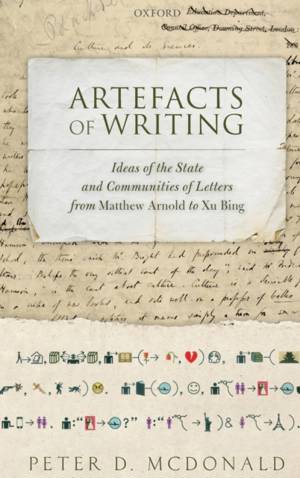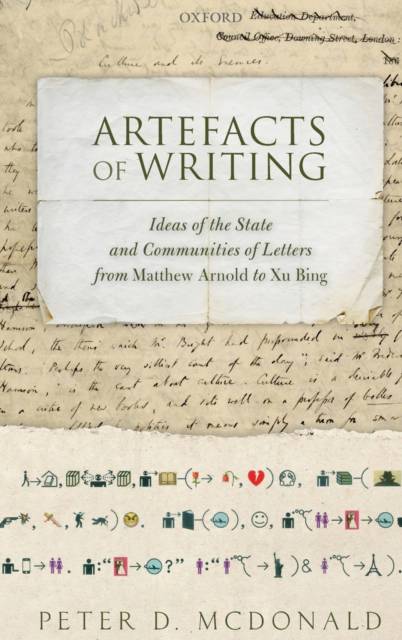
Je cadeautjes zeker op tijd in huis hebben voor de feestdagen? Kom langs in onze winkels en vind het perfecte geschenk!
- Afhalen na 1 uur in een winkel met voorraad
- Gratis thuislevering in België vanaf € 30
- Ruim aanbod met 7 miljoen producten
Je cadeautjes zeker op tijd in huis hebben voor de feestdagen? Kom langs in onze winkels en vind het perfecte geschenk!
- Afhalen na 1 uur in een winkel met voorraad
- Gratis thuislevering in België vanaf € 30
- Ruim aanbod met 7 miljoen producten
Zoeken
Artefacts of Writing
Ideas of the State and Communities of Letters from Matthew Arnold to Xu Bing
Peter D McDonald
Hardcover | Engels
€ 107,95
+ 215 punten
Omschrijving
Some forms of literature interfere with the workings of the literate brain, posing a challenge to readers of all kinds, including professional literary critics. In Artefacts of Writing, Peter D. McDonald argues they pose as much of a challenge to the way states conceptualise language, culture, and community. Drawing on a wealth of evidence, from Victorian scholarly disputes over the identity of the English language to the constitutional debates about its future in Ireland, India, and South Africa, and from the quarrels over the idea of culture within the League of Nations in the interwar years to UNESCO's ongoing struggle to articulate a viable concept of diversity, McDonald brings together a large ensemble of legacy writers, including T.S. Eliot, James Joyce, and Rabindranath Tagore, putting them in dialogue with each other and with the policy-makers who shaped the formation of modern states and the history of internationalist thought from the 186s to the 194s. In the second part of the book, he reflects on the continuing evolution of these dialogues, showing how a varied array of more contemporary writers from Amit Chaudhuri, J. M. Coetzee, and Salman Rushdie to Antjie Krog, Arvind Krishna Mehrotra, and Es'kia Mphahlele cast new light on a range of questions concerning education, literacy, human rights, translation, indigenous knowledge, and cultural diversity that have preoccupied UNESCO since 1945. At once a novel contribution to institutional and intellectual history and an innovative exercise in literary and philosophical analysis, Artefacts of Writing affords a unique perspective on literature's place at the centre of some of the most fraught, often lethal public controversies that defined the long-twentieth century and that continue to haunt us today
Specificaties
Betrokkenen
- Auteur(s):
- Uitgeverij:
Inhoud
- Aantal bladzijden:
- 340
- Taal:
- Engels
Eigenschappen
- Productcode (EAN):
- 9780198725152
- Verschijningsdatum:
- 12/12/2017
- Uitvoering:
- Hardcover
- Formaat:
- Genaaid
- Afmetingen:
- 157 mm x 236 mm
- Gewicht:
- 739 g

Alleen bij Standaard Boekhandel
+ 215 punten op je klantenkaart van Standaard Boekhandel
Beoordelingen
We publiceren alleen reviews die voldoen aan de voorwaarden voor reviews. Bekijk onze voorwaarden voor reviews.









